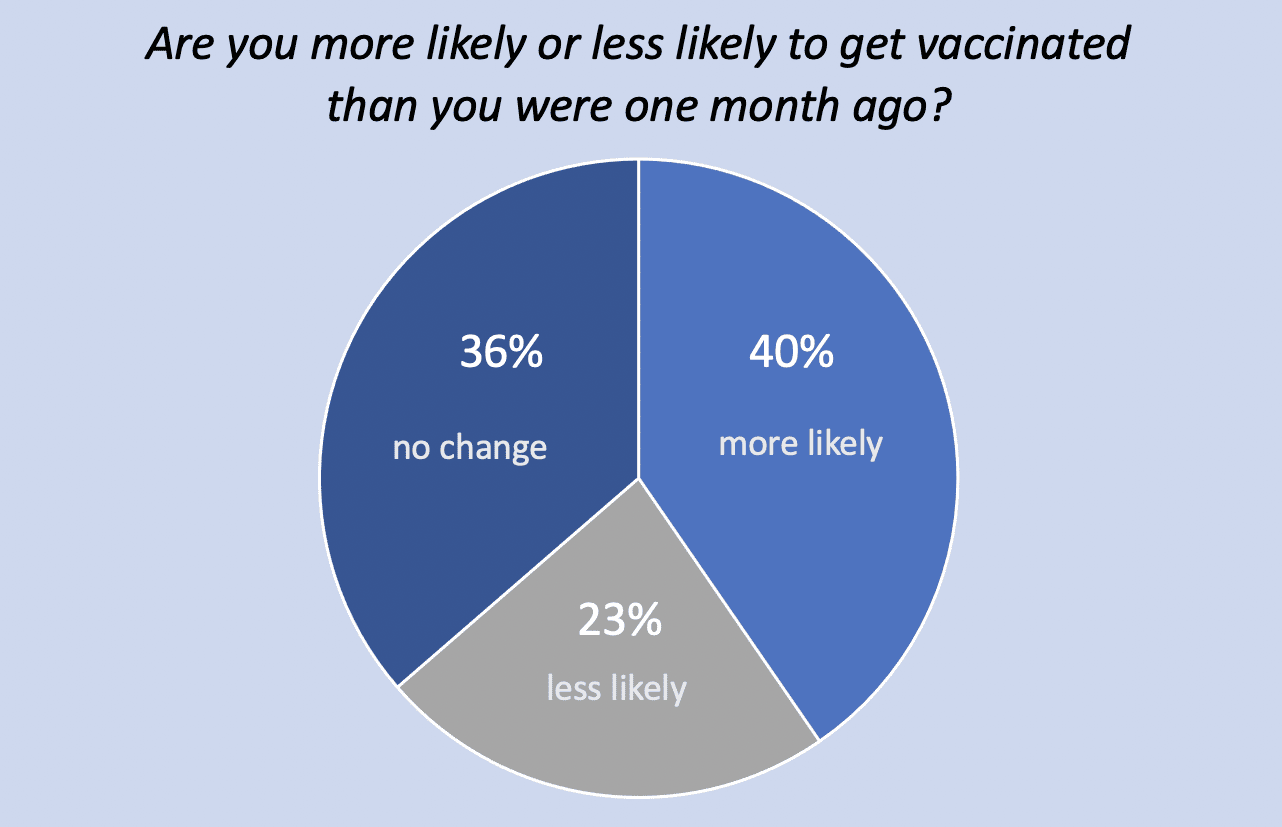Poll: Despite Johnson & Johnson pause, vaccine confidence is rising, while partisan divide on vaccination is narrowing

In the April 15-16 poll, taken after the CDC and FDA recommended pausing use of the Johnson & Johnson vaccine, 76% of voters said they were as likely or more likely to get vaccinated as they were one month ago.
April 2021
Americans consider the CDC and FDA’s decision to pause the Johnson & Johnson vaccine proof that rigorous safety monitoring is working, according to a national poll conducted April 15-16 by pollster Frank Luntz for the de Beaumont Foundation. Seventy-six percent said the action does not decrease their likelihood of getting vaccinated, and an overwhelming majority (87%) of those who have been vaccinated said they would “definitely” make that same decision again.
“Americans recognize the Johnson & Johnson vaccine pause for what it is — a clear sign that our safety protocols are working the way they’re supposed to,” said Brian C. Castrucci, DrPH, president and chief executive officer of the de Beaumont Foundation. “Government officials must continue to be transparent and to use clear, consistent language about the vaccines.”
“The communication efforts, for the most part, are working,” Luntz said. “But to reach the more hesitant populations, it’s going to take doctors and public health leaders, not politicians.”
Poll findings reveal that the perception gap about vaccines between Republicans and Democrats seems to be narrowing. Sixty-three percent of all respondents, 60% of Trump voters, and 72% of Biden voters said they agree with the statement “The bottom line is COVID-19 vaccines save lives, and Americans should continue to get vaccinated as soon as possible.” Only 16% of all voters and 19% of Trump voters disagreed. A similar number, 61% of all voters and 60% of Trump voters, said they agreed with the statement “The COVID-19 vaccines are safe and effective.” That compares with 66% of Biden voters. See detailed findings.
Overall, 40% of respondents said they were more likely to get the COVID-19 vaccine than they were a month ago – including 38% of Trump voters and 48% of Biden voters. Among all poll respondents, 46% said they had already been vaccinated, including 43% of Trump voters and 52% of Biden voters. Of those, 48% have received the Moderna vaccine; 46% Pfizer; and 7% Johnson & Johnson. Among those who have not been vaccinated, only 19% said they would “definitely not” get vaccinated, including 23% of Trump voters and 10% of Biden voters.
“There are still meaningful, measurable differences between Republicans and Democrats when it comes to their acceptance of COVID vaccines,” Luntz said. “The good news is that the partisan gap is decreasing and overall vaccine confidence is rising.”
A full 71% of Trump voters said they have either received at least one dose of a vaccine or definitely or probably will — up from 59% in a de Beaumont poll conducted just one month ago (March 14-16).

Key Findings
There are some signs of concern about the Johnson & Johnson vaccine. Nearly one-third of voters (32%) said they would never get a J&J vaccine. That includes 44% of Trump voters and 18% of Biden voters. Respondents said the following messaging would be most assuring about the safety of the Johnson & Johnson vaccine:
- Safety monitoring is working and the government is prioritizing the safety of Americans. The safety monitoring system for vaccines identified the issue as soon as it arose, and this was shared with the public transparently, showing a commitment to safety.
- As of today, fewer than 10 people — of the 6.8 million who have gotten the Johnson & Johnson vaccine to date — have reported serious blood clotting side effects.
- These events are extremely rare. The chance of being struck by lightning is literally twice that of getting a blood clot from the J&J COVID-19 vaccine.
- The risk of getting a serious blood clot from the J&J COVID-19 vaccine is less than of getting a blood clot from birth control medication, from smoking, or for those hospitalized with COVID-19.
The poll was followed by an April 18 nationwide focus group with 17 Trump voters who said they will “possibly” get vaccinated or probably will not. The purpose of the focus group was to better understand people’s reaction and concerns surrounding the Johnson & Johnson vaccine pause and help identify language that would further build vaccine confidence.
The poll is the fourth in a series of national polls focused on “Changing the COVID Conversation,” designed to guide more effective public health messaging during this pandemic among diverse populations, including Black Americans, Latinx communities, Republicans, rural residents, and others. See details.
Poll Methodology
The nationwide survey was conducted April 15-16 by pollster Frank Luntz, with 1,000 registered voters, including an oversample of 200 voters age 18-34, modeled demographically based on voter turnout in the 2020 presidential election (+3% margin of error).
Highlights of Focus Group with Hesitant Voters
As a follow-up to the poll, pollster Frank Luntz led an April 18 focus group with 17 Republicans who say they “possibly” will or “probably won’t” get vaccinated. See clips below to understand concerns about safety, side effects, and personal liberties.
Reasons for concerns about vaccines: “We don’t know the long-term effects.” “I just don’t see the rush.”
Personal liberties: “We’re being told what to do and how to do it. It’s like we don’t have enough sense to make our own decisions.”
A return to normal: a moving target? “The lure of freedom is tremendous, but you’re getting a short-term return and don’t know if it’s going to last.” “It started with ‘give us two weeks,’ and here we are a year later. So when does it stop?”


